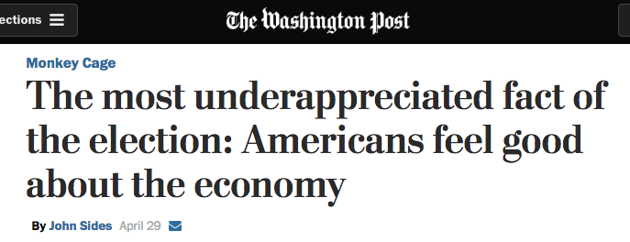Previously in the Hmmmm series, please see this, this, this, this. Now a very interesting analysis from John Sides in the WaPo:

Short version of his analysis: most Americans think that they themselves are doing better, but the country as a whole is going to hell:
What is equally striking about this election year is how little this growing economic optimism has affected broader assessments of the direction of the country.
Matthew Yglesias in Vox says more about John Sides’s findings too. Including this point on how there can be a politically salient expression of rage by some part of the electorate, when on the whole Americans are not feeling betrayed or left behind:
Obviously an average is an average (it is worth noting that the positive trend is evident for all income groups), and in a big country you can still have enormous pockets of anger and discontent alongside an overall atmosphere of placidity.
In most domains that aren't politics, attracting a passionate minority following is a perfectly good business strategy. It's a great way to secure ratings for a television show, for example, whether it's The Apprentice or The Sean Hannity Show. But in politics you need a majority, and it doesn't seem to be the case that the majority is feeling some historically anomalous level of economic discontent.
More explanation another time (I’m on the road overseas) — or, you can check out my March issue article, or the other items in this thread. Sketched-out hypothesis: having been caught by surprise (as I was too) by Trump’s popularity, many reporters over-interpreted it to believe that most Americans (as opposed to an important minority) were as convinced as he was that the country was in ashes and that nothing went right any more.